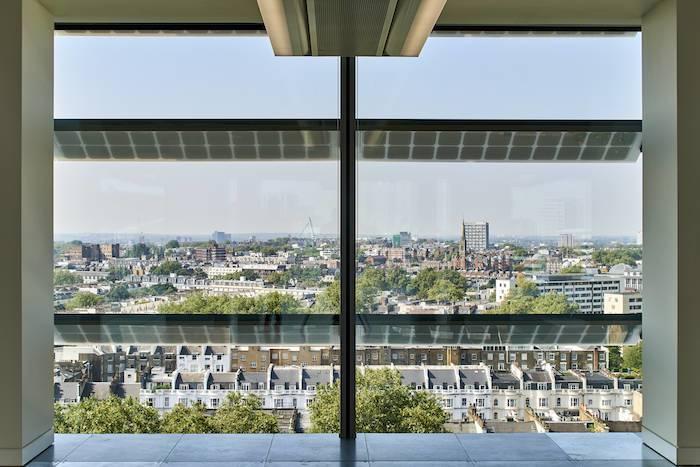
By Tom Idle
The low-carbon fuel cell installed at 20 Fenchurch Street – London’s ‘Walkie Talkie’ building – cost £4 million, but contributes 7% of the entire building’s electricity needs. Landsec are also committed to improving the amount of onsite renewable technology with a new target to achieve 3 MW capacity by 2030. Current capacity has doubled to 1.4 MW this summer with their largest installation to date, a 785 kWp solar PV system at White Rose Shopping Centre in Leeds. The system provides 20% of all landlord power, reducing costs for customers and increasing the asset’s resilience, and has become the largest of its kind in the UK.
Elsewhere, site specific energy reduction assessments continue to find more energy reduction opportunities. The 65 projects agreed last year cost around £2.4 million, but will save customers 7.7m kWh of energy and £877,000 a year in reduced energy bills, with a ROI of under 3 years.
This year, more projects have been identified across the portfolio – projects that will “continue to nudge the dial,” says Byrne. But it is the other more innovative “unknowns” that offer the step change needed for a business like Landsec, he says. “We need to be trialling new technologies and using new models.”
Adopting a bold, science-based target is a move that has had a much bigger impact than first realised, he adds, transforming energy management programmes, which rather than purely focus on operational activities are much more strategic. There is now a more stringent set of requirements for making sure new developments are more sustainable, and a new Responsible Property Investment Policy demands a consideration of sustainability when acquiring new assets, meaning carbon, as well as costs, are formally considered by the Investment Committee.
“Our staff have really got behind it too,” adds Kate Attwooll, Sustainability Executive “We have a long history of creating jobs and opportunities and our people are very passionate about that. But things like energy efficiency have always been seen as a bit too tech-y to really bring our teams together. But that’s changing. We have new training programmes to make sure that everybody knows sustainability matters.” Group-wide KPIs focused on energy management have certainly helped to focus the mind, especially when performance determines bonuses – not only for the CEO and board, but for junior execs too.
The 13.2% reduction in energy intensity achieved across Landsec’s portfolio has seen tenants avoiding energy and carbon costs of £2.9m, when compared to 2013/14, every year. Meanwhile, new developments are increasingly being marketed using their efficiency and wellbeing credentials. The Zig Zag development, featured natural light levels, ventilation, renewable energy and rainwater harvesting, and was billed as “the thoughtful building,”
And ultimately, Landsec’s renewed focus on climate change is about risk mitigation, encouraging innovation along the supply chain, collaborating with partners in new and interesting ways and building a brand strength that will continue to make the business an employer and landlord of choice. “Sustainability is about ensuring that Landsec is in existence, and healthy, in five, ten and 20 years time,” says Robert Noel, the company’s Chief Executive. “We must anticipate the changing requirements of our customers, our communities, our employees and our partners and ensure we keep them in balance.”
Westgate, Oxford: The ultra low-carbon retail destination
Beyond finding operational efficiencies to properties, Landsec is committed to assessing and reducing the embodied carbon of an asset – how much carbon dioxide was emitted during the manufacture, transport and construction of building materials. The goal is to beat company and industry embodied carbon intensity benchmarks. It’s not easy though, as it demands that partners across the supply chain also get on board with reducing emissions. However, the business admits that if it gets it right, it can make a huge difference.
During the development of its Westgate, Oxford retail destination, the company has so far avoided more than 30,000 tonnes of embodied carbon emissions thanks to better planning, design and construction. That is the same volume of emissions as the property is expected to create during operation over the next 30 years.
To achieve this, Landsec used a high volume of recycled materials, buying local recycled aggregate and concrete with a high recycled content. Disposal sites were established close to the construction site reducing transportation emissions. By the time the project is complete, total emission avoidance should reach 39,000 tonnes – a huge achievement given that the total embodied carbon emissions across the whole business totalled 126,000 tonnes last year.
Comment By Simon Webley Research Director, Institute of Business Ethics
It is true that consistently good ethical behaviour promotes not only good business, but long term success. Corporate relations with local and national communities is one of the critical matters that any business wishing to be sustainable has to address.
If corporate behaviour in its widest sense is not considered acceptable, you will not have a long term business: good people will not work for you and borrowing from the financial sector will be more expensive as the risk of your failing rises.
Landsec clearly realises this. Their goals for the efficient use of energy and growth in the usage of recycled materials are having a measurable effect not only at their building sites, but also on the level of fuel consumption in their commercial properties around the country.
The basis of this trend is ‘Science Based Targets’. Installing quantities of measuring devices may seem ‘over the top’, but it definitely awakens awareness of the importance of environmental preservation.
Points to note:
- Landsec is tackling the issue of climate change in a practical way
- Opportunities to reduce energy use are increasing
- Staff are trained to meet challenging Key Performance Indicators (KPIs) regarding energy use
- Energy saving is measured in tons not pounds
TriplePundit has published articles from over 1000 contributors. If you'd like to be a guest author, please get in touch!














